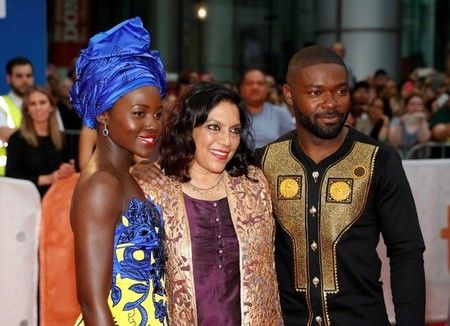Advertisement
‘Queen of Katwe’ brings uplifting underdog chess tale to Toronto

TORONTO (Reuters) – Chess may not be the most visual of sports to watch in a film, but the true story of an impoverished Ugandan girl overcoming obstacles to become a chess champion transcends the game, according to the cast of “Queen of Katwe.”
The Walt Disney Co film, out in theaters on Sept. 23, is a “life-affirming African story,” star David Oyelowo told Reuters at the red-carpet premiere on Saturday at the Toronto International Film Festival.
“As someone of African descent, we don’t see enough of that I believe in cinema, in the press as well, so I’m very proud to see a story like this made by Disney as well,” Oyelowo added.
“Queen of Katwe” follows the story of Phiona Mutesi, a young girl with no education being raised by her single mother and siblings in Katwe, an impoverished district of the capital, Kampala.
The real Phiona Mutesi, aged around 20 years old now, and Robert Katende also attended the premiere on Saturday, with the young chess champion saying she could not believe a movie had been made about her life.
“I’m just a person from nowhere and now I’m coming to this. I can’t believe it. It’s just exciting,” she said.
In the film, Phiona is introduced to chess through charity worker Robert Katende, played by Oyelowo, who encourages Katwe uneducated children to play the strategy game, likening it to their inherent survival instincts learned in the slums.
As Phiona starts to beat all her challengers, Katende takes her and the Katwe children to compete in tournaments with players from wealthier backgrounds and education. The young girl often doubts her abilities, but her coach keeps guiding her to believe in herself.
Oscar-winner Lupita Nyong’o, who plays Phiona’s fiercely protective and indefatigable mother, Harriet, said that while she was not yet a mother, she learned about the selflessness of motherhood.
“It’s almost like your heart is dislocated and running around and just feeling the fear, inhabiting the fear of a mother letting her chicks out every day to survive,” she said.
Director Mira Nair said she had lived in Kampala for 27 years and brought her own experience of the city and culture to the film.
Nair said she wanted to portray “the country from within, feeling the dignity and the complete joy even during the best of struggles.”
(Reporting by Reuters TV; Writing by Piya Sinha-Roy; Editing by Peter Cooney and Marguerita Choy)












